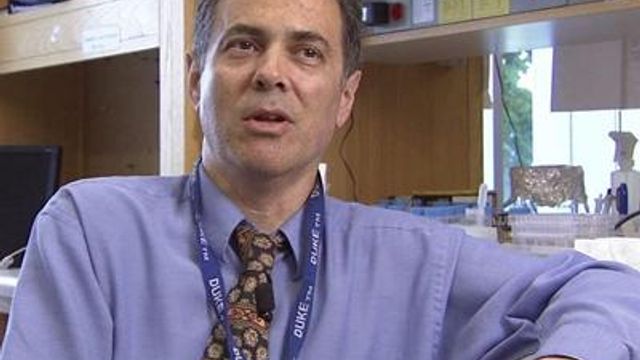Undetected Lyme disease nearly killed Duke researcher
A cancer researcher did everything he knew to stay healthy, but undiagnosed and untreated Lyme disease took its toll on his heart, nearly leading to death.
Posted — Updated"I just felt like I was running on low octane," Spector said.
He learned that his heart was beating out of rhythm, but he couldn't imagine why.
"I lived in New England for a number of years, and I used to run in the woods, and I've been to Cape Cod. Could this be Lyme disease?"
Prevalent in the Northeast and transmitted by ticks, Lyme disease is a serious health condition that can lead to complications involving the joints, heart and nervous system if left untreated.
The classic mark is a rash that looks like a ringed bull's-eye target around the tick bite, but not everyone has it. Symptoms can often be confused with other medical problems.
One test showed Spector's exposure was extremely high, but a second test was negative. His doctors said he needed a pacemaker/defibrillator implant, which should have made him feel better.
"I didn't feel better," he said. "I kept feeling pretty bad."
Then, he developed arthritis and was given an antibiotic, which cleared it up. But it raised a question.
"Now, I've got arthritis that goes away with doxycycline, which is the antibiotic you use to treat Lyme disease," Spector said. "I mean, this has to be Lyme disease. That test had to be wrong."
Spector kept pushing to be tested for Lyme disease. Another test in 1997 confirmed Spector had the disease, but it had already caused damage.
After starting work as a breast cancer researcher at Duke in 1998, his heart continued to decline.
Last July, Spector's doctor put him on a heart transplant list, and within 36 hours, a donor heart was available. The surgery was a success.
"Forty-eight hours later, I was walking three miles around the cardiology floors," Spector said.
Now, he's back to working full-time as a researcher and a heart disease volunteer with the American Heart Association.
On Saturday, he will participate in the 2010 Start! Triangle Heart Walk, which raises money to fund research and education efforts of the American Heart Association.
"I'm the captain of one of the Heart Walk teams," Spector said. "We'll be doing our share to help heart disease. That's just an incredible thrill for me."
• Credits
Copyright 2024 by Capitol Broadcasting Company. All rights reserved. This material may not be published, broadcast, rewritten or redistributed.





